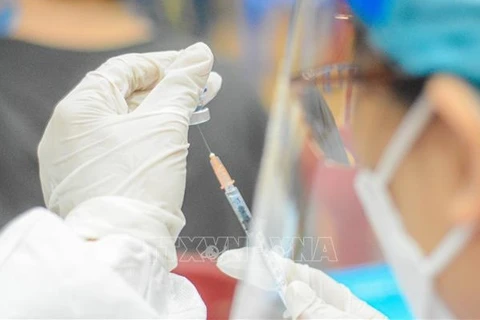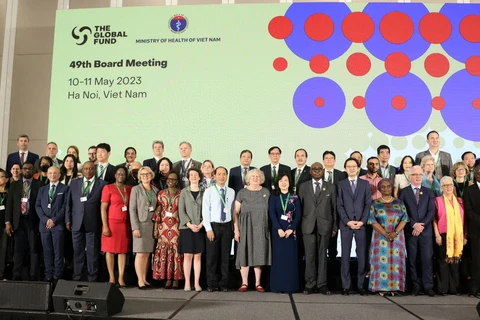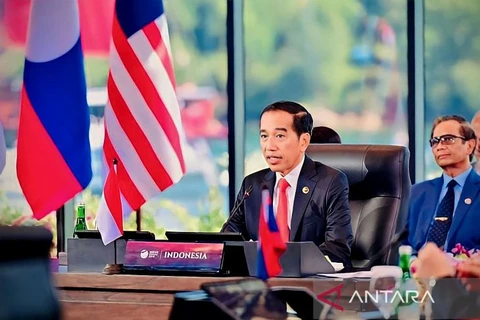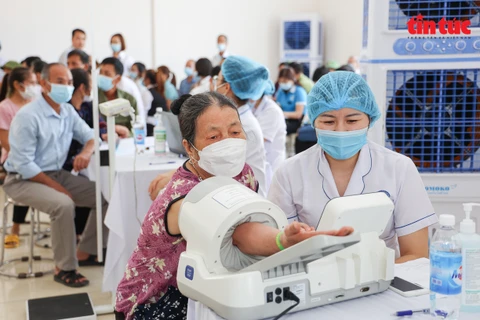 A village-based health worker (right) treats a resident's injury in Ban Ngo Commune, Xin Man district, in the northern mountainous province of HA Giang. (Photo: VNA)
A village-based health worker (right) treats a resident's injury in Ban Ngo Commune, Xin Man district, in the northern mountainous province of HA Giang. (Photo: VNA) Phan Ngoc Ly is one diligent healthcare worker in Ban Ngo commune, Xin Man district. Despite a demanding schedule, Lys consistently rises to the occasion, ensuring he completes all the tasks entrusted to him.
Ly's responsibilities are multifaceted, encompassing the dissemination of public health policies and participation in community health training courses. Additionally, he extends first aid and routine medical care to the local population.
Furthermore, he shoulders the responsibility of encouraging the local populace to seek examination and treatment at health stations when unwell, rather than resorting to ritualistic customs in the hope of curing ailments. This role, in particular, underscores the health workers' commitment to the modernisation of healthcare within these regions.
According to Vuong Thanh Nguyen, head of Xin Man district’s Health Centre, the district currently has 18 commune-level administrative units, including one with 139 village-based health workers.
Despite their extensive responsibilities and the relatively modest remuneration they receive, the district's village-based health workers are both enthusiastic and conscientious in carrying out their duties.
As per Circular No. 07/2013/TT-TTCP, the role of a village-based health worker is indeed multifarious. However, Nguyen pointed out, the allowances these workers receive remained somewhat meagre.
Regulations stipulate that health workers in disadvantaged communes receive an allowance equivalent to half of the current basic salary. In contrast, those serving in other areas are entitled to an allowance amounting to 30 per cent of the base salary.
At present, the basic salary stands at 1.49 million VND (approximately 63.4 USD) per month. Consequently, for many, the economic compensation does not adequately reflect the breadth and importance of the work they perform.
Vuong Minh Hieu, who leads the commune’s health station, noted that the insufficient allowances had had tangible consequences. Since the start of the year, several village-based health workers had resigned from their posts, driven away by the economic inadequacy of their remuneration.
Hieu explained that the allowance failed to meet their daily living expenses. Consequently, these health workers sought employment with companies offering higher salaries.
In a bid to counteract this unfortunate trend, the district's health sector had devised a strategy, explained Nguyen. Village-based health workers were now given the opportunity to take on additional roles, such as working for the commune-level Youth Union, thereby supplementing their income and potentially retaining their valuable healthcare services.
Changing awareness
Nguyen noted the positive impact of the health workers' outreach activities on the local population. He highlighted that these efforts had led to a shift in local attitudes.
Child marriage rates had seen a steady decline, and the elimination of outdated customs had made significant strides in recent times, he added.
In order to augment the effectiveness of these village-based health workers, the district’s health sector planned to hold short training courses, spanning three to five days. This educational initiative was intended to equip the health workers with the knowledge and skills they need to increase their operational efficiency in the future, explained Nguyen.
Vuong Van Ba, a local resident, reflected on the transformation within his own family and others in the community. Previously, it was common practice to invite a shaman to perform rituals in the hope of healing the sick. However, the intervention of the village-based health workers, who examined the sick and urged them to seek medical care at health stations and hospitals, had caused a significant cultural shift.
As a result of these interventions, Ba's family no longer resorted to invoking a shaman to cure ailments, he said, signifying a tangible transition towards modern healthcare practices.
“Going to medical facilities for examination and treatment has helped us to recover faster,” he said.
Hoang Van Sy, another inhabitant of the commune, lauded the dedication of the village-based health workers, crediting them for fostering trust and enhancing local understanding of healthcare.
"We no longer believe in the curative power of worship," he said, underscoring the significant cultural shift that had taken place within the community.
Influenced by the village-based health workers, Sy has also taken measures to educate his children and grandchildren about the drawbacks of consanguineous and child marriages./.
VNA























